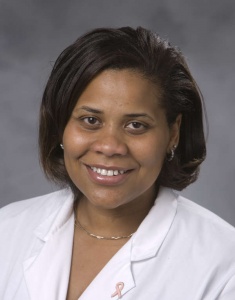 Camille Frazier-Mills, MD, MHS, assistant professor of medicine (Cardiology), came to Duke as an internal medicine resident in 1999. The first time she visited Duke, she met the members of the Minority Recruitment and Retention Committee (MRRC) and felt at home right away. Today she is the associate chair of the MRRC, focusing on alumni affairs. “The MRRC is like family,” she says.
Camille Frazier-Mills, MD, MHS, assistant professor of medicine (Cardiology), came to Duke as an internal medicine resident in 1999. The first time she visited Duke, she met the members of the Minority Recruitment and Retention Committee (MRRC) and felt at home right away. Today she is the associate chair of the MRRC, focusing on alumni affairs. “The MRRC is like family,” she says.
Dr. Frazier-Mills directs both the Duke EP Clinics and the Syncope and Dysautonomia Clinic. She also does clinical research on devices related to rhythm management.
Q: How did you decide to become a doctor?
A: I wanted to be a doctor ever since I was a kid. There was a medical school not too far from where I grew up and sixth-graders could go on weekends and do dissections and listen to different doctors and do rounds with them. My older brother did the program and he was like, “Ugh, this is gross,” and he’s now an engineer and a businessman. I did it and I was like, “This is so cool!” In college, I double-majored in biology and Africana studies, which helped me to better understand who I was in the greater society.
Q: How did you end up coming to Duke for your residency?
A: In medical school I decided I wanted to be at a great program that had cardiology. I visited Duke in December and it was warm, and I was from Ohio. The weather was great and the people were awesome.
Q: How did the Minority Recruitment and Retention Committee influence your decision?
A: Even though there weren’t a huge number of African Americans here, people seemed really supported. The MRRC took us out to dinner and some of the residents of color talked about their experience. The next day we met with Michelle Winn, MD, (former associate professor of medicine who passed away in 2014) and Laura Svetkey, MD, professor of medicine (Nephrology), at MRRC. They left a very good impression.
Q: What’s your current role with MRRC?
A: My role is with alumni affairs—networking with people who come through our program and maintaining relationships to encourage them to come back or take our voice out into the wider world. Every year we have a dinner during alumni weekend. We also send out newsletters and invite alumni speakers for different lectureships we have.
Q: Tell us about the Visiting Clinical Scholars Program for medical students.
A: It’s a School of Medicine project with input from the MRRC — Kimberley Evans, MD, associate vice chair for diversity and assistant professor of medicine (Nephrology), works with the School of Medicine to select participants. It’s an opportunity for medical students from other schools, who are under-represented minorities, to come and do a rotation here at Duke. We get exposure to students we might not have had contact with otherwise, and we can see if they would be a good fit here in our internal medicine residency program.
Q: Why is the diversity of Duke Health providers important?
A: There are several reasons. You want a health system to represent the real world and there’s a very high percentage of under-represented minorities in Durham. The best talent comes from us all mixing together because we gain from each others’ experience and knowledge. And Duke tries to make diversity in the forefront so that patients feel comfortable — they know they are getting great care and they have providers who look like them. I can’t tell you how many times when I walk into patients’ rooms and they are excited and proud that I am their doctor.
Q: How would you describe the Department of Medicine’s commitment to increasing diversity among its trainees and providers?
A: It’s intentional. As we’ve changed leadership in the Department of Medicine over the years, the commitment has remained the same in terms of continuously providing support through MRRC and really pushing on diversity in recruiting interns, residents, fellows, and faculty. It shows you that it’s really a core value as opposed to one individual’s specific mission. The department’s commitment to diversity has really helped Duke grow in diversity and now you can see it up to the level of the chancellor of health affairs, the president and CEO of Duke University Health System, Eugene Washington, MD.